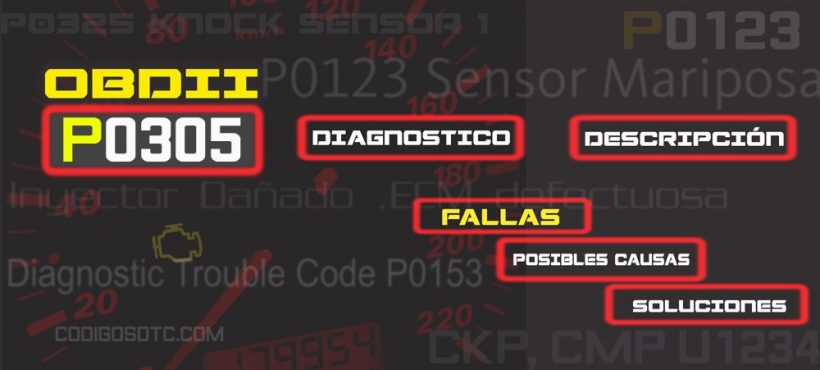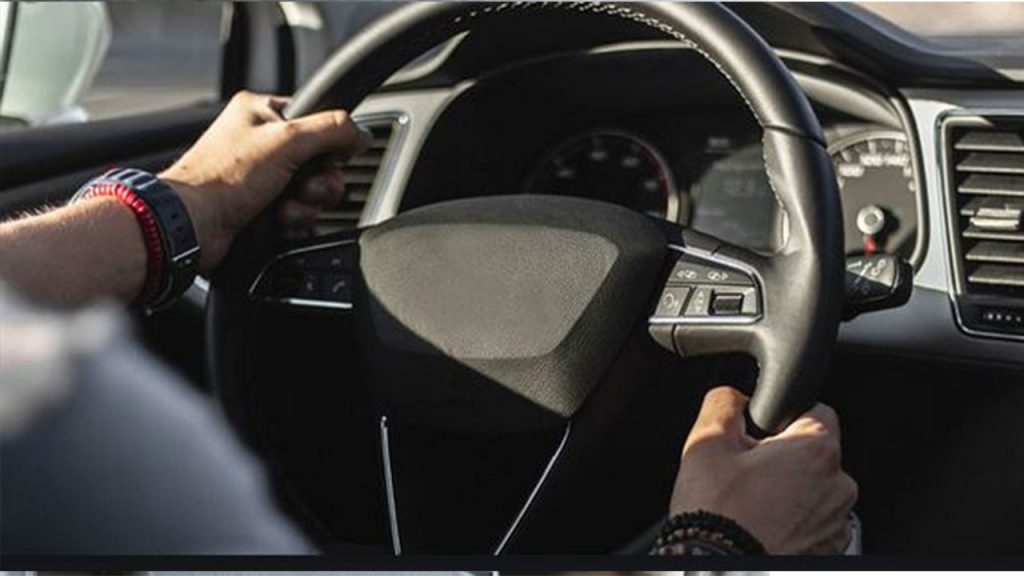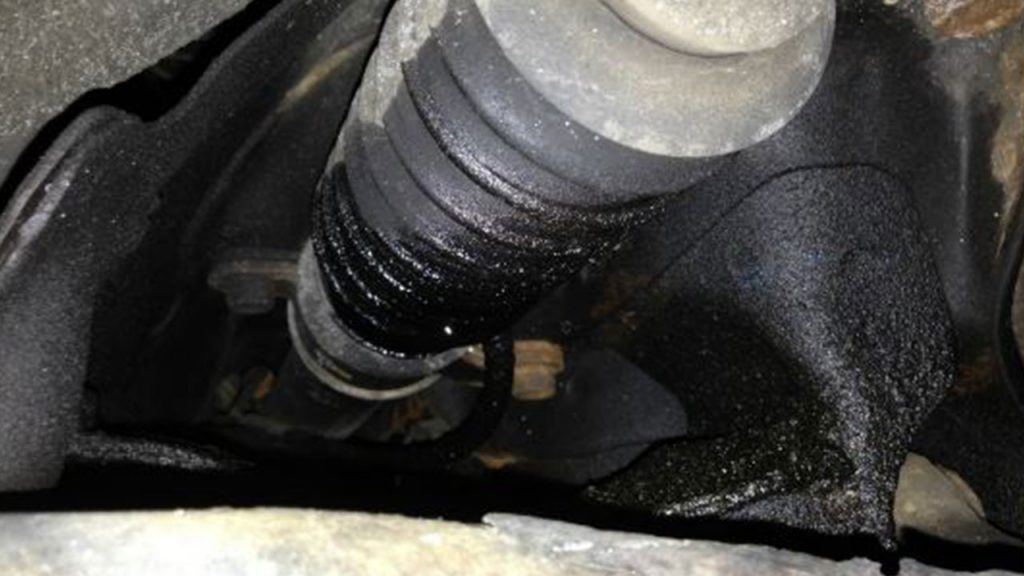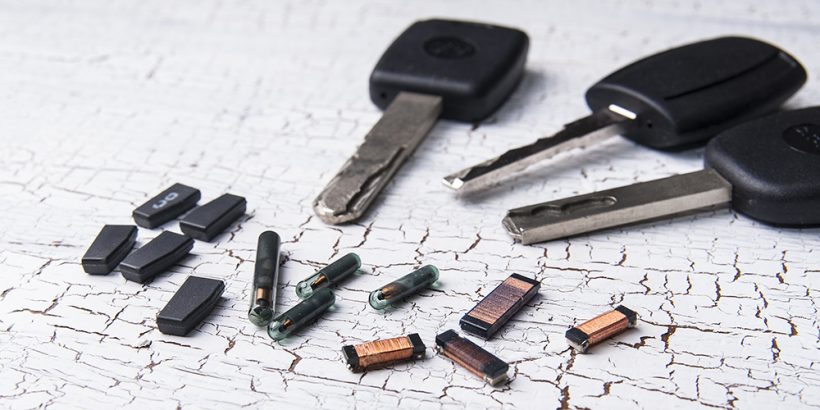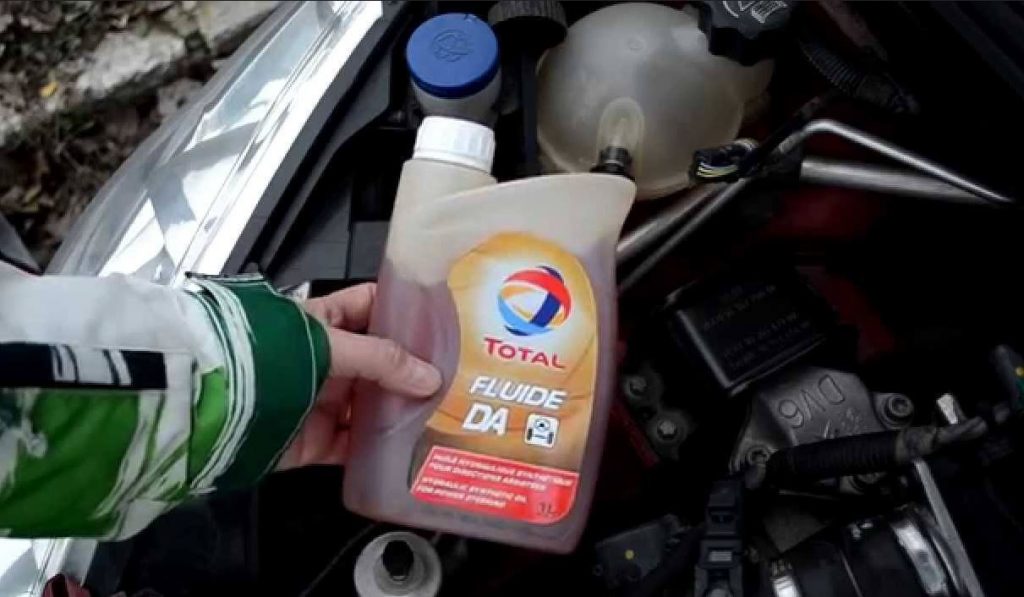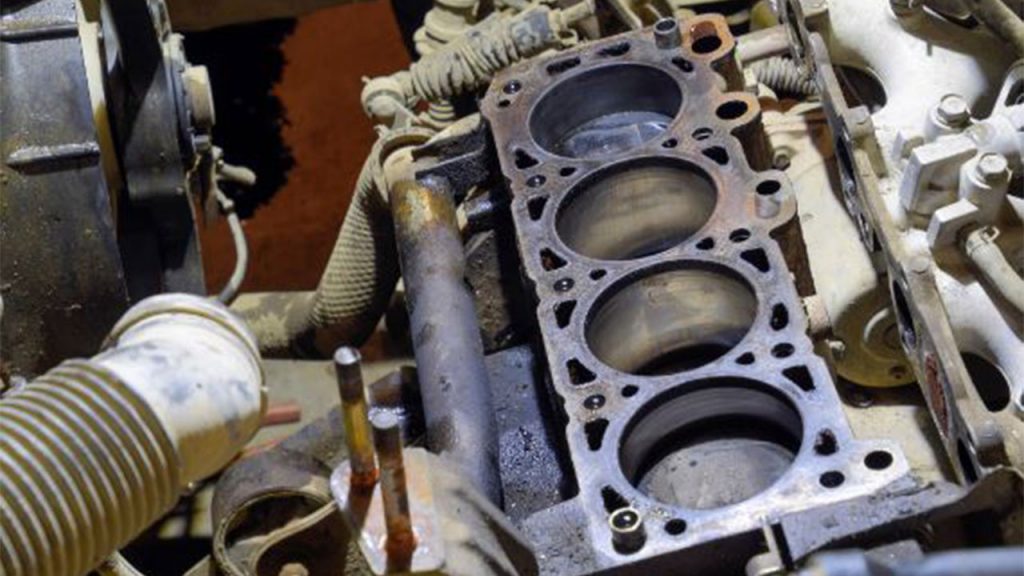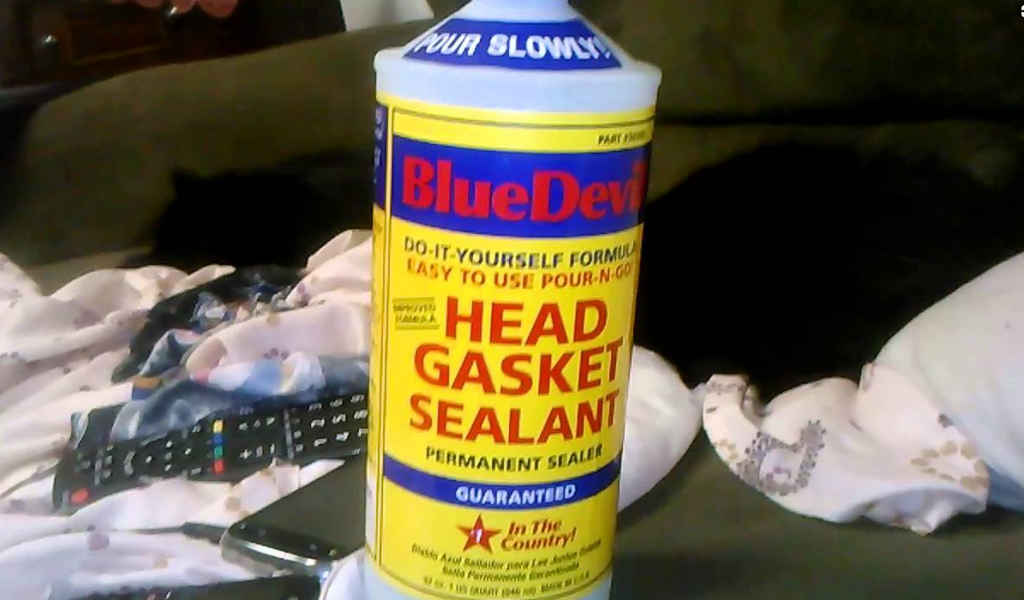Last updated on July 11th, 2023 at 05:47 pm
Are you having a p0305 error code? It’s not unusual for most people. The p0305 code is specifically a cylinder 5 misfire and there are a lot of factors to could result or lead to it
Understanding cylinder misfire causes and misfire symptoms along with how to fix a cylinder misfire problem is the way to go when you constantly experience cylinder or engine misfires when accelerating or while your car is idling.
In this post, we are going to discuss every bit of it to give you valuable insight into the underlying issues affecting your vehicle, ranging from causes to diagnosing the problem, identifying the symptoms, before fixing the issue to tips for managing driving with a misfiring cylinder and then how to fix the cylinder misfire problems.
So below are the topics we are going to consider in this article in addition to cylinder misfire causes, cylinder misfire symptoms, how to fix a cylinder misfire, and tips on driving with a misfiring cylinder
- What Does P0305 Mean?
- P0305 Cylinder 5 misfire BMW
- What is a misfire in a Car?
- Car Combustion Cycle- 4 stroke engine parts
- Common Misfire causes
- P0305 Symptoms and Diagnosis
Cylinder 5 Misfire – What Does P0305 Mean
What P0305 means?
This is a specific misfire in your 5th cylinder before worrying too much where you do explain what does possibly means for you and your engine
P0305 is a specific code for the cylinder 5 misfire, since this code in the 5th cylinder, that means it only applies to v6, v8, and v12 Engines.
Let say to take BMW for instance.
P0305 BMW code (P0305 Cylinder 5 misfire BMW)
A P0305 BMW code will mean that the car cylinder 5 is misfiring steady or at a random pace.
If this occurs, you have to check for intake leaks and no leaks are found then move on to find ways to replace your spark plugs on the cylinder.
Don’t get confuses here will talk about how to identify each problem and the causes of cylinder 5 misfires.
So to get into all that lets first look at the meaning of misfire.
Read Also About Flashing Check engine Light and Blinking Cruise Control Light
What is a misfire in a Car?
A misfire is the desynchronization of the combustion cycle within the car engine.
You can also say that a misfire is a symptom that occurs when the car engines combustion cycle is either to fast or too slow.
Car Combustion Cycle ( 4 stroke engine parts)
There 4 main stroke combustion cycle within a car and if your car is not made before 1980 then know that it has 4 stroke combustion cycle which are:
- Intake
- Compression
- Power
- And Exhaust
So what happens here that your cylinder intakes the fuel oxygen mix, the mix is then compressed, the spear plug ignites the mix to get power and finally the cylinder opens to release the exhaust.
2 stroke engine diagram
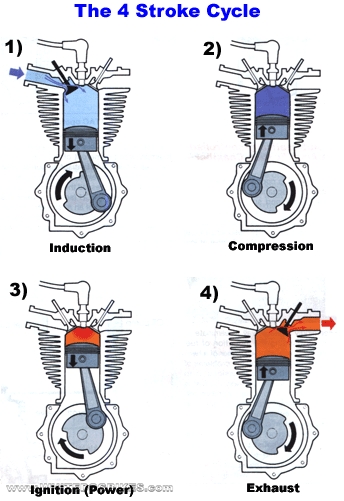
The requirements for Combustion.
Combustion reaction requires 3 elements which are:
- Oxygen
- Fuel
- And Spark
The intake stroke introduces oxygen and fuel. Then the power stroke provides the spark.
What could cause a misfire on one cylinder?
When any of these 3 elements or components above (oxygen, fuel, and sparks) are messed up or worse, the process gets out of the sink and then that is when you get this p0305 error code, indicating a cylinder misfire be it misfire cylinder 1, 2, 3, 4 or cylinder 5 misfires.
Though the above 3 causes might be the common reason for a misfire for this case, there are a lot of more other reasons for misfire and we are going to look into some of the common misfire causes below.
Cylinder misfire causes: What Causes cylinders 5, 4, 3, 2, & Cylinder 1 Misfire?
Misfiring in a car cylinder commonly also referred to as engine misfire occurs when one or more cylinders in an engine do not perform their duties accordingly by producing power correctly. This then leads to a shuddering, power reduction or fuel consumption increases, engine failure to start up properly, and some other adverse results. There can be various reasons for misfiring between cylinders 1, 2 to 5 cylinders; with some being more serious than others.
So when your car engine misfire when accelerating here are what causes engine misfire at idle or when accelerating on all cylinders be it cylinder 2,1,4, 3, or cylinder 5.
#1- Air Fuel Mixture Component
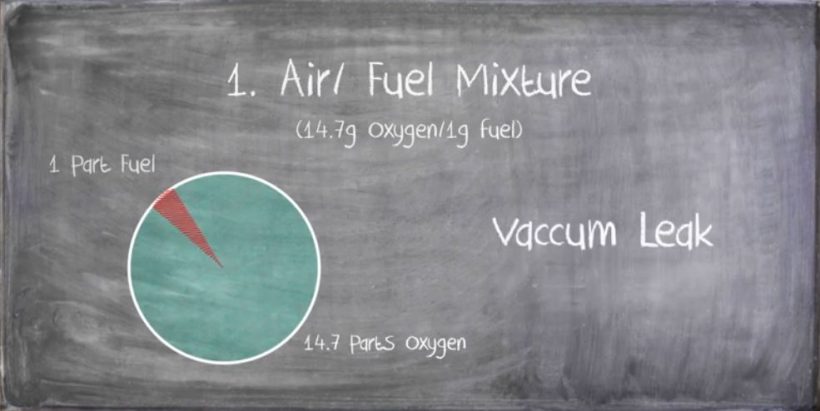
The car engine requires a very specific mixture of fuel and oxygen, so if for a chance there happens to be a vacuum leak somewhere in the car or vehicle; then it could not be getting enough oxygen for that mixture to enable the car engine function properly.
So if you have ever asked yourself the question below then you should know the answer by now:
“Can a vacuum leak cause a single cylinder misfire?”
Then yes is the answer. A vacuum leak can be the cause of a single-cylinder misfire.
And some of the common vacuum Leaks that can cause this are:
- i) a crack in the hose
- ii) a leak in the hose
- iii) or an air intake leak
Spark Plug Ignition
Cylinder misfire causes are typically traceable back to an ignition spark plug’s which is responsible for lighting off the fuel-air mixture in engine cylinders. Once your car spark plugs exceed 12,000 miles and become worn or dirty, its performance will become ineffective and can lead to a misfiring cylinder 1. So the main causes of the misfire cylinder 1 causes is mostly due to old or bad spark plug ignition., for instance. Even modern cars equipped with advanced engine controls and high-quality spark plugs may still suffer this fate should a defective one trigger misfiring problems cylinder 1 causes.
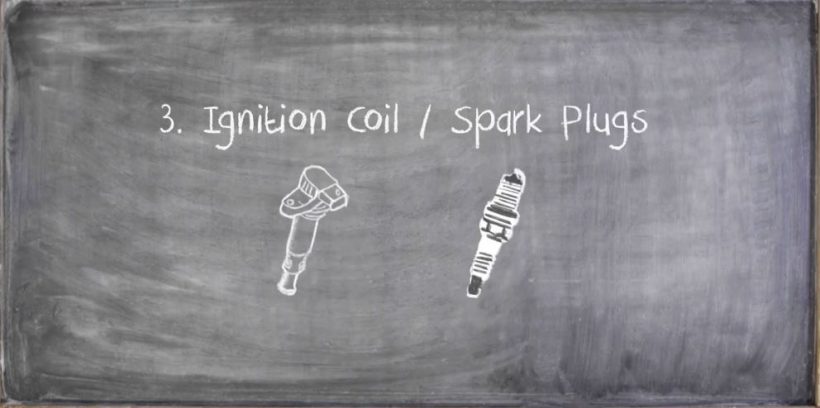
Faulty Ignition Coil
An ignition coil, as an essential element of an engine’s ignition system, converts the battery’s low voltage into the higher voltage required by spark plugs to ignite fuel. If its function becomes compromised it could result in a weak or absent spark, leading to a misfire on cylinder 4 and other areas of engine operation.
Bad or clogged Fuel Injection Complication
Bad or faulty fuel injectors may contribute to misfire cylinder 2 causes since the injectors are what provide the precise amounts of fuel at just the right moment for engine combustion chambers to take place correctly and produce combustion. Damages or Clogs in fuel injectors caused by dirt or carbon build-up can prevent the delivery of adequate amounts of fuel entering the engines which will result in misfires.
Faulty Emissions Systems Are Inefficient
Faulty emissions systems in your vehicles could result in less efficient engine performance and operation, which will be a reason for a single-cylinder misfire causes. Your car parts such as oxygen sensors, exhaust gas recirculation (EGR) valves, and catalytic converters could all be affected and could be a source for misfiring.
Vacuum Leaks
When investigating what may cause misfires in Cylinder 3 and other engine cylinders, vacuum leaks must also be considered when investigating what may cause their misfiring. Leakage occurs in vacuum hoses used to regulate airflow regulating engine vacuum pressure which then leads to an incorrect air-fuel ratio in each of its respective cylinders and leads to misfires – this issue often being difficult to find due to their often hidden location within the engine bay.
Leaky Seal or Gasket
Seals and gaskets in engines play an integral role in protecting from fluid leakage between engine parts. Should one fail, engine oil or coolant could seep into the combustion chamber, disrupting ignition of the air-fuel mixture ignition and leading to misfires of individual cylinders.
Fuel Leak or Congestion component
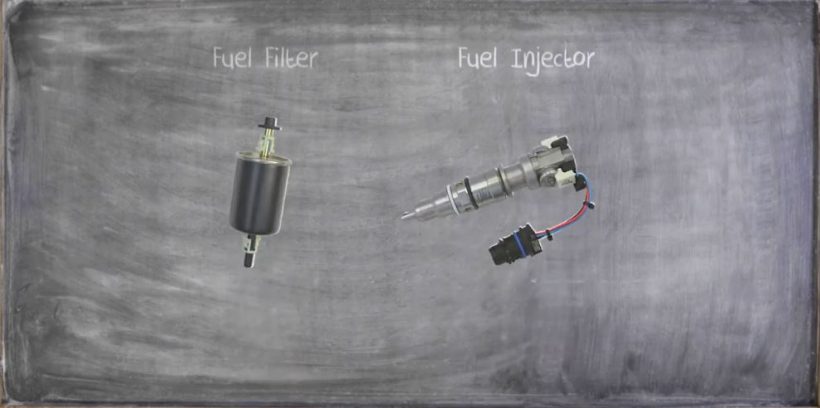
The next causes of misfire are a fuel leak or congestion component. This usually has to do with the fuel filter or the fuel injector.
To rectify this problem, I suggest you start by changing the fuel filter first because it is a cheaper fix that will cost around $25 to $70.
Off which replacing the fuel injector is a little more expensive and it is a more complicated electronic device which will cost anything around $600 to $1200 to fix.
Damaged Catalytic Converter
An issue with my catalytic converter may also contribute to why is my cylinder 2 misfiring or other cylinders are misfiring since this integral component of the emissions control system metabolizes combustion gases into less damaging compounds that don’t contribute to misfires in other cylinders. A dysfunctional catalytic converter may restrict exhaust gases which causes overheating which results in misfiring cylinders or cause overheating which then triggers misfire occurrence.
What causes engine to misfire at idle,
So when you notice an engine misfire at idle just know that it can be caused by a number of issues ranging from worn spark plugs or malfunctioning fuel injectors to vacuum leaks and defective ignition coils and sometimes issues in emissions systems or engine seal leakage could either be the cause. So a proper diagnosis will be needed in order to minimize further damage to the car and to keep the repair costs to a minimum.
Cylinder and Engine misfire symptoms showing P0305 error code
it’s crucial to be conscious of the “misfire signs” for both engine and misfire cylinder symptoms. Engine misfire is not an uncommon issue.
The “misfire symptoms”, that I will show below can differ depending on the impacted cylinder. A lone misfire like the “misfire 1 cylinder”, might not be as easily perceived compared to a scenario where multiple cylinders are affected such as a “misfire 2 cylinder” situation.
Early identification of these cylinder misfiring symptoms can assist in mitigating extensive engine damage. Common “engine misfire symptoms” or misfire cylinder symptoms or signs include diminished power output, erratic or rough idling, and heightened fuel consumption.
Now here is the misfire cylinder symptoms down.
1. Solid Check Engine Light Comes On
This is usually the first and most immediate symptom of a P0305 error or any engine and cylinder misfire issues. When the check engine light comes on, it’s an indication that the vehicle’s onboard computer has detected a problem that can potentially affect the vehicle’s emissions, operation, and performance. While this doesn’t specifically mean that the problem lies with cylinders 5 or 4, a diagnostic scan that reveals a P0305 code would confirm which particular cylinder is affected whether it is a misfire 1 cylinder, cylinder 2 misfire, or the rest of the cylinders.
2. Fuel Smell from the Exhaust:
A cylinder misfire, such as the P0305 error, can result in unburnt fuel being dumped into the exhaust system. This not only leads to a strong fuel smell around the vehicle, but it can also create black smoke from the exhaust and might even cause a reduction in gas mileage. In diesel engines, this symptom might be more apparent due to the nature of diesel fuel and its combustion properties, leading to a significantly rich and distinctive exhaust odor.
3. Check Engine Light is Flashing:
If the check engine light isn’t merely illuminated but actively flashing, this is an indication of a more critical issue. Generally, a flashing light means that the misfire is continuous or severe and poses a risk of damaging the engine or the catalytic converter. In such cases, it’s advised to stop the vehicle and seek professional help immediately, as continuous driving might lead to costly repairs.
4. Engine Runs Rough and Shakes:
When a cylinder misfire occurs, it disrupts the balance of the engine, causing it to run unevenly and vibrate or shake, particularly at idle. In diesel engines, this symptom can be amplified due to their higher compression ratios and the combustion nature of diesel, leading to a rougher engine operation and more noticeable vibrations that can be felt throughout the vehicle.
5. Lack of Power from the Engine:
A misfiring cylinder is essentially a non-contributing member of the engine’s power. This leads to a noticeable loss of power, especially in situations that demand more power, like climbing steep hills or accelerating quickly. In diesel engines, which are known for their high torque, this loss might be more discernible, affecting the overall power and performance significantly.
6. Hesitation or Jerking During Acceleration:
As soon as you attempt to accelerate and the engine demands more power, misfires of individual cylinders hinder their effectiveness and cause hesitation or jerkiness when trying to accelerate. This symptom may become particularly noticeable on diesel engines where smooth acceleration is considered an essential performance characteristic – this discomforting experience may signal that there’s something more serious at play here.
Tips for when driving with a misfiring cylinder
- Driving with misfiring cylinders should be avoided for several reasons. A misfire can damage your vehicle’s engine, exhaust system components like the catalytic converter, as well as impact the driving experience with reduced power and performance. But in cases of no immediate options available to you here are a few pointers you may keep in mind:
- Driving Slowly and Avoid Hard Acceleration: Fast speeds and rapid acceleration can worsen misfires, possibly leading to further damage. Therefore, it’s wiser to drive slowly while limiting acceleration whenever possible.
- Avoid High RPMs: Operating an engine at high RPMs increases engine load and can contribute to misfires; for this reason it is recommended that RPMs be as low as possible.
- Minimize Driving: To address misfire issues effectively and limit further potential damage caused by overstretch driving, it is crucial that driving should be limited until further solutions can be identified and implemented. The more time that passes between misfire inspection and repair efforts and actual resolution is wasted.
- Avoid Towing or Carrying Heavy Loads: Towing or carrying heavy loads puts additional strain on the engine and can exacerbate misfire symptoms, so if possible it would be wiser not to tow or carry heavy loads until your misfire issue has been addressed.
- As Soon As Possible: As Soon As you notice misfiring cylinders on your vehicle, schedule an inspection appointment with an established mechanic as soon as possible to have your engine thoroughly examined and repaired.
How to replace ignition coils
After you have switched those ignition coils, go ahead and grab your OBD2 Scanner which you can get for cheap on Amazon here.
Mind you any good OBD2 scanner will work here.
So when you scan the car and you notice that the p0305 code is changed to p0304 then you should know it is an ignition problem and that means you have to replace the ignition.
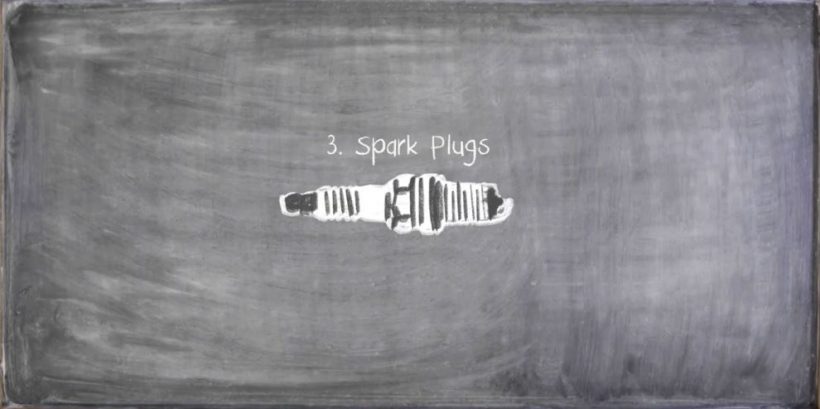
If it is not the ignition, then it is the spark plug cheap is cheap to fix.
Watch the video below to learn how you can change or replace the car spark plugs yourself.
How to Replace spark plugs Ultimate Guide
Code P0305 Common Diagnosis Mistakes
Loose-Fitted electrical connectors and broken or disconnected vacuum hoses are often overlooked.
Code P0305 Diagnosis Steps
When running P0305 diagnostic text on your car the following tools are must-have diagnosis tools:
- Screwdrivers (you may have this at home already but if not click here to get it on Amazon)
- The Tools You Need that you might not have already at home are:.
These tools are all available on Amazon, just click each one to check out the current price.
How Bad is P0305 Code? ( When P0305 cylinder 5 misfire detected)
Code P0305 Severity – Severe
Do not try to ignore a P0305 code, it requires immediate action to prevent further damage to the car.
Overlooking this error could lead to ignition failure, catalytic converter damage, and unsafe/dangerous conditions while operating the vehicle.
Related Articles on how they could harm your car can be found here.
Conclusion
P0305 which is a cylinder 5 misfire problem can cause by so many reasons which could be spark plug wires, bad fuels, or any other air intake components or even a mechanical problem within the combustion cycle.
And we have stated the 3 most common and the easiest to fix. All other cylinders 5 misfire issues will most likely require an expert or a real mechanic.
So check the 3 out yourself first, before going to a mechanic. Hope this was helpful? Please feel free to share the article if it helped you.
Related Article: How to Solve a Flashing check engine light & Blinking cruise control light Issues

